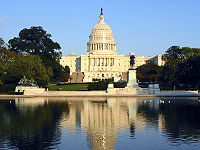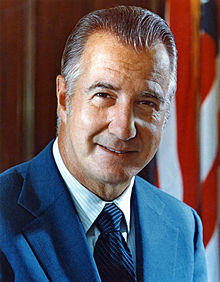- 91st United States Congress
-
91st United States Congress 
United States Capitol (2002)Duration: January 3, 1969 – January 3, 1971 Senate President: Hubert Humphrey to Jan. 20, 1969
Spiro AgnewSenate Pres. pro tem: Richard Russell, Jr. House Speaker: John W. McCormack Members: 100 Senators
435 RepresentativesSenate Majority: Democratic Party House Majority: Democratic Party Sessions 1st: January 3, 1969 – December 23, 1969
2nd: January 19, 1970 – January 2, 1971<90th 92nd> The Ninety-first United States Congress was a meeting of the legislative branch of the United States federal government, composed of the United States Senate and the United States House of Representatives. It met in Washington, DC from January 3, 1969 to January 3, 1971, during the first two years of the first administration of U.S. President Richard Nixon.
The apportionment of seats in this House of Representatives was based on the Eighteenth Census of the United States in 1960. Both chambers had a Democratic majority.
Contents
Major legislation
 President Richard Nixon paying his last tributes to Sen. Everett Dirksen, who died September 7, 1969.
President Richard Nixon paying his last tributes to Sen. Everett Dirksen, who died September 7, 1969.
- December 30, 1969: Federal Coal Mine Health and Safety Act, Pub.L. 91-173
- 1969: Tax Reform Act of 1969, Pub.L. 91-172
- January 1, 1970: National Environmental Policy Act, Pub.L. 91-190
- April 3, 1970: Environmental Quality Improvement Act, Pub.L. 91-224
- May 21, 1970: Airport and Airway Development Act, Pub.L. 91-258, title I
- August 12, 1970: Postal Reorganization Act (United States Postal Service), Pub.L. 91-375
- August 15, 1970: Economic Stabilization Act
- September 22, 1970: District of Columbia Delegate Act, Pub.L. 91-405
- October 15, 1970: Organized Crime Control Act, Pub.L. 91-452 (including the Racketeer Influenced and Corrupt Organizations Act ("RICO")
- 1970: Urban Mass Transportation Act of 1970, Pub.L. 91-453
- October 26, 1970: Bank Secrecy Act, Pub.L. 91-508
- October 27, 1970: Controlled Substances Act, Pub.L. 91-513
- 1970: Rail Passenger Service Act (Amtrak), Pub.L. 91-518
- December 24, 1970: Family Planning Services and Population Research Act of 1970, Pub.L. 91-572
- December 24, 1970: Plant Variety Protection Act, Pub.L. 91-577
- December 29, 1970: Occupational Safety and Health Act (OSHA), Pub.L. 91-596
- December 31, 1970: Clean Air Act Extension, Pub.L. 91-604
- December 31, 1970: Housing and Urban Development Act of 1970, Pub.L. 91-609, including title VII, National Urban Policy and New Community Development Act of 1970
- 1971: Lead-Based Paint Poisoning Prevention Act, Pub.L. 91-695
Party summary
The count below identifies party affiliations at the beginning of the first session of this Congress, and includes members from vacancies and newly admitted states, when they were first seated. Changes resulting from subsequent replacements are shown below in the "Changes in membership" section.
Senate
- Democratic: 57 (majority)
- Republican: 43
TOTAL members: 100
House of Representatives
- Democratic: 243 (majority)
- Republican: 192
TOTAL members: 435
Leadership
 Senate President Spiro Agnew
Senate President Spiro Agnew
Senate
- President: Hubert Humphrey (D), until January 20, 1969
- Spiro Agnew (R), from January 20, 1969
- President pro tempore: Richard Russell, Jr. (D)
Majority (Democratic) leadership
- Majority Leader: Mike Mansfield
- Majority Whip: Ted Kennedy
Minority (Republican) leadership
- Minority Leader: Everett Dirksen, until September 7, 1969
- Hugh Scott, from September 24, 1969
- Minority Whip: Hugh Scott, until September 24, 1969
- Robert P. Griffin, from September 24, 1969
House of Representatives
- Speaker: John W. McCormack (D)
Majority (Democratic) leadership
- Majority Leader: Carl Albert
- Majority Whip: Hale Boggs
Minority (Republican) leadership
- Minority Leader: Gerald Ford
- Minority Whip: Leslie C. Arends, Republican of Illinois
Members
This list is arranged by chamber, then by state. Senators are listed in order of seniority, and Representatives are listed by district.
See also: United States House election, 1968Senate
Senators are popularly elected statewide every two years, with one-third beginning new six year terms with each Congress. Preceding the names in the list below are Senate class numbers, which indicate the cycle of their election. In this Congress, Class 1 meant their term ended with this Congress, requiring reelection in 1970; Class 2 meant their term began in the last Congress, requiring reelection in 1972; and Class 3 meant their term began in this Congress, requiring reelection in 1974.
See also: Category:United States SenatorsSee also: Category:United States congressional delegations by stateHouse of Representatives
The names of members of the House of Representatives elected statewide on the general ticket or otherwise at-large, are preceded by an "A/L," and the names of those elected from districts, whether plural or single member, are preceded by their district numbers.
Many of the congressional district numbers are linked to articles describing the district itself. Since the boundaries of the districts have changed often and substantially, the linked article may only describe the district as it exists today, and not as it was at the time of this Congress.
See also: Category:Members of the United States House of RepresentativesSee also: Category:United States congressional delegations by stateChanges in membership
The count below reflects changes from the beginning of the first session of this Congress
Senate
- replacements: 3
- Democratic: 2 seat net gain
- Republican: 2 seat net loss
- deaths: 1
- resignations: 2
- Total seats with changes: 3
State
(class)Former senator Reason for change Successor Date of successor's
installationIllinois
(3)Everett Dirksen (R) Died September 7, 1969 Ralph Tyler Smith (R) September 17, 1969 Illinois
(3)Ralph Tyler Smith (R) Successor elected November 3, 1970 Adlai Stevenson III (D) November 17, 1970 Delaware
(1)John J. Williams (R) Resigned December 30, 1970 William V. Roth, Jr. (R) January 1, 1971 California
(1)George Murphy (R) Resigned January 2, 1971 John V. Tunney (D) January 2, 1971 House of Representatives
- replacements: 14
- Democratic: 2 seat net gain
- Republican: 2 seat net loss
- deaths: 10
- resignations: 8
- Total seats with changes: 18
District Vacator Reason for change Successor Date of successor's
installationCalifornia 27th Edwin Reinecke (R) Resigned January 21, 1969 after becoming Lieutenant Governor of California Barry Goldwater, Jr. (R) April 29, 1969 Wisconsin 7th Melvin R. Laird (R) Resigned January 21, 1969 after being appointed United States Secretary of Defense Dave Obey (D) April 1, 1969 Tennessee 8th Robert A. Everett (D) Died January 26, 1969 Ed Jones (D) March 25, 1969 Montana 2nd James F. Battin (R) Resigned February 27, 1969 after being appointed judge for the US District Court for the District of Montana John Melcher (D) June 24, 1969 Illinois 13th Donald Rumsfeld (R) Resigned May 25, 1969 after being appointed Director of the Office of Economic Opportunity Phil Crane (R) November 25, 1969 Massachusetts 6th William H. Bates (R) Died June 22, 1969 Michael J. Harrington (D) September 30, 1969 Illinois 6th Daniel J. Ronan (D) Died August 13, 1969 George W. Collins (D) November 3, 1970 New Jersey 8th Charles S. Joelson (D) Resigned September 4, 1969 after becoming judge of Superior Court of New Jersey Robert A. Roe (D) November 4, 1969 New Jersey 6th William T. Cahill (R) Resigned January 19, 1970 after becoming Governor of New Jersey Edwin B. Forsythe (R) November 3, 1970 California 24th Glenard P. Lipscomb (R) Died February 1, 1970 John H. Rousselot (R) June 30, 1970 California 35th James B. Utt (R) Died March 1, 1970 John G. Schmitz (R) June 30, 1970 Connecticut 2nd William St. Onge (D) Died May 1, 1970 Robert H. Steele (R) November 3, 1970 Ohio 19th Michael J. Kirwan (D) Died July 27, 1970 Charles J. Carney (D) November 3, 1970 Pennsylvania 9th George Watkins (R) Died August 7, 1970 John H. Ware III (R) November 3, 1970 Illinois 1st William L. Dawson (D) Died November 9, 1970 Vacant Not filled this term South Carolina 1st L. Mendel Rivers (D) Died December 28, 1970 Vacant Not filled this term Delaware At-large William V. Roth, Jr. (R) Resigned December 31, 1970 after being appointed to the US Senate Vacant Not filled this term California 38th John V. Tunney (D) Resigned January 2, 1971 after being appointed to the US Senate Vacant Not filled this term Employees
- Architect of the Capitol: J. George Stewart, appointed October 1, 1954, died May 24, 1970
Senate
- Secretary: Francis R. Valeo of the District of Columbia, reelected January 3, 1969
- Sergeant at Arms: Robert G. Dunphy of Rhode Island, reelected January 3, 1969
- Chaplain: Edward L. R. Elson (Presbyterian), elected January 9, 1969
- Democratic Party Secretary: J. Stanley Kimmitt
- Republican Party Secretary: J. Mark Trice
House of Representatives
- Clerk: W. Pat Jennings of Virginia, reelected January 3, 1969
- Sergeant at Arms: Zeake W. Johnson of Tennessee, reelected January 3, 1969
- Doorkeeper: William M. Miller of Mississippi, reelected January 3, 1969
- Postmaster: H. H. Morris of Kentucky, reelected January 3, 1969
- Parliamentarian: Lewis Deschler
- Chaplain: Edward G. Latch (Methodist), elected January 10, 1967
References
- ^ both representatives were elected statewide on a general ticket
- Martis, Kenneth C. (1989). The Historical Atlas of Political Parties in the United States Congress. New York: Macmillan Publishing Company.
- Martis, Kenneth C. (1982). The Historical Atlas of United States Congressional Districts. New York: Macmillan Publishing Company.
External links
- Biographical Directory of the U.S. Congress
- U.S. House of Representatives: Congressional History
- U.S. Senate: Statistics and Lists
United States Congresses (and years begun) 111 (2009)
112 (2011)
113 (2013)Categories:
Wikimedia Foundation. 2010.


